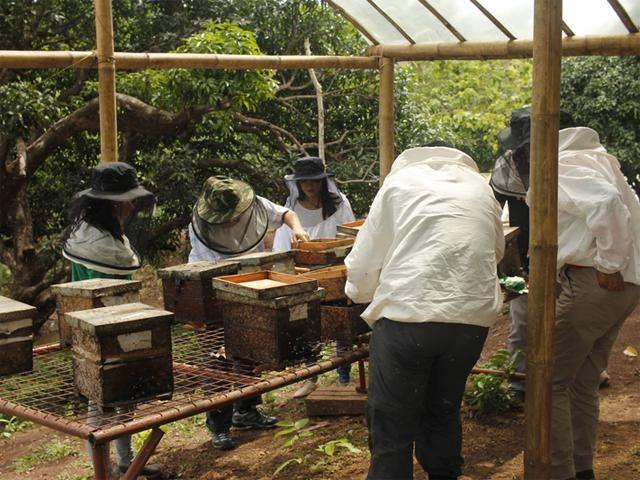UPLB experts upbeat on bee culture at Palawan tourism farm
Bee experts from the University of the Philippines-Los Banos visited anew the sprawling agro-tourism Yamang Bukid Farm in Puerto Princesa City’s Barangay Bacungan early this month to “validate” the viability of some 12 colonies of the stingless bees (Tetragonal biroi) they brought in as experimental specimen.

Early this year, UPLB’s scientists introduced the local Palawan stingless bees (or kiot) to the farm in efforts at restoring to normal levels nature’s greatest pollinators that were impacted by super Typhoon Yolanda’s destructive sweep years ago.
“We were excited because of the bee food plants they grow prior to this conceptualized project in beekeeping,” said Dr. Cleofas Cervancia, a bee scientist from UPLB who led the three-person validation team.
Cervancia said the previous dozen colonies were generally in good condition and that the farm could be ready for an expansion.
She said at least 50 additional colonies were brought in “because of the moment we think that’s the only number that farm can support,” she said, adding, “In the future they need to expand the existing bee pasture in order to increase the number of colonies.”
An area near the farm entrance that was used to be a flower nursery was temporarily utilized as repository for the new colonies.
The bee scientist said that among the species being introduced at the farm was that of the Tetragonula biroi, a major bee subgroup endemic in Southeast Asia.
Anna Locsin, another UPLB bee expert, said their studies have indicated the presence of such species in at least four different localities in the Philippines, including one in Palawan.
The apian experts pointed out several advantages of raising stingless bees in a tourism farm-like setting, which included the bees’ non-aggression against humans and pets.
As a source of food, Locsin said stingless bees produce high-grade honey with less sugar content, compared to their European counterpart of the genus mellifera.
“I think it was between half percent to .8 percent. so for people who are very conscious or have problems with sugar or a lot of sugar—maybe the diabetics. they can actually take this negligible sucrose content. so health wise, it was very excellent source,” Locsin pointed out.
The UPLB team also did a seminar-workshop on the basics of beekeeping at YBF’s new training facility here, with farm beekeepers and bee enthusiasts and focal persons from municipal agriculture offices Palawan in attendance. —LBG, GMA News




